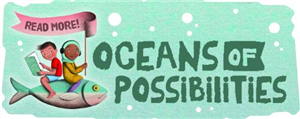- Prairie Creek Elementary
- Library Media Center
- Resources
-
 Johnson County Library Summer Reading Program
Johnson County Library Summer Reading Program
- The Johnson County Libraries provide a wonderful summer reading program for families. Read more with this year's theme is "Ocean of Possibilities". The library will host in-person activities, activities in local parks, online programs, and make-and-take craft projects. The libraries are giving away a free book to students in June when they visit the library. Students can also participate in bookmark and sticker contests.
- Epic
- Epic has books at many different reading levels and some books have a read-aloud option.
- Pebble Go & Pebble Go Next
- These are nonfiction databases that offer different resources for research and reading. Pebble Go is focused on grades K-3 and Pebble Go Next has materials for students in grades 3-5. Students can access both websites from school or home. Please contact your student’s teacher for assistance in logging in.
- State Library of Kansas
- The link takes you directly to the Kids and Parents portion of the state library website. The state library offers online access to research, databases, and online books through Britannica, Tumblebooks, and Bookflix.
The Research Process
At Prairie Creek Elementary, we use the Big 6 and Super 3 information problem solving models to guide you through the research process. The Big 6 Problem Solving Model is geared for students in third grade and above. The Super 3 Problem Solving Model is for students in second grade and below.
The Big 6 and Super 3 help you "think about your thinking," a process called metacognition. Planning and thinking about your approach to research will enable you to become a more effective learner.
-
Big 6 Problem Solving Model
- Task Definition
- What do I need to do?
- What questions do I need to answer?
- What will my end product look like?
- How will it be graded?
- Information Seeking Strategies
- How will I find the information I need?
- Location & Access
- What resources will I need?
- How will I decide if my sources are valid?
- Use of Information
- Read, listen, view
- Pull out the information that will work for you.
- Take NOTES!
- Using your own words, write down the information on a notecard or notebook.
- Cite your sources!
- Remember to cite your sources as you go.
- Citations Forms for your sources.
- Read, listen, view
- Synthesis
- Organize your information
- Write a rough draft
- Create an outline
- Create a storyboard
- Make a sketch
- Put your information together into a final product. Include a bibliography.
- Present your final product.
- Organize your information
- Evaluation
- If your teacher gave you a rubric or grading checklist, use it to make sure you’ve included everything before submitting your final product.
- What did I learn?
- What worked well?
- Task Definition
-
Super 3 Problem Solving Model
Super 3 is an information problem solving model for young children based on the Big 6. It gives students a process for tackling both school and everyday tasks. The Super 3 are:
- Plan
- What am I supposed to do?
- What do I need to get the job done?
- What do I want it to look like when I'm done?
- Do
- I must locate the things I will need (books, websites, materials, etc.).
- I need to ask questions, read, and take notes.
- I need to use the information I find to create something.
- Review
- Did I do what I was supposed to do?
- Am I proud of what I've done?
- Is there something else I should do before I say I am done?
- Plan

